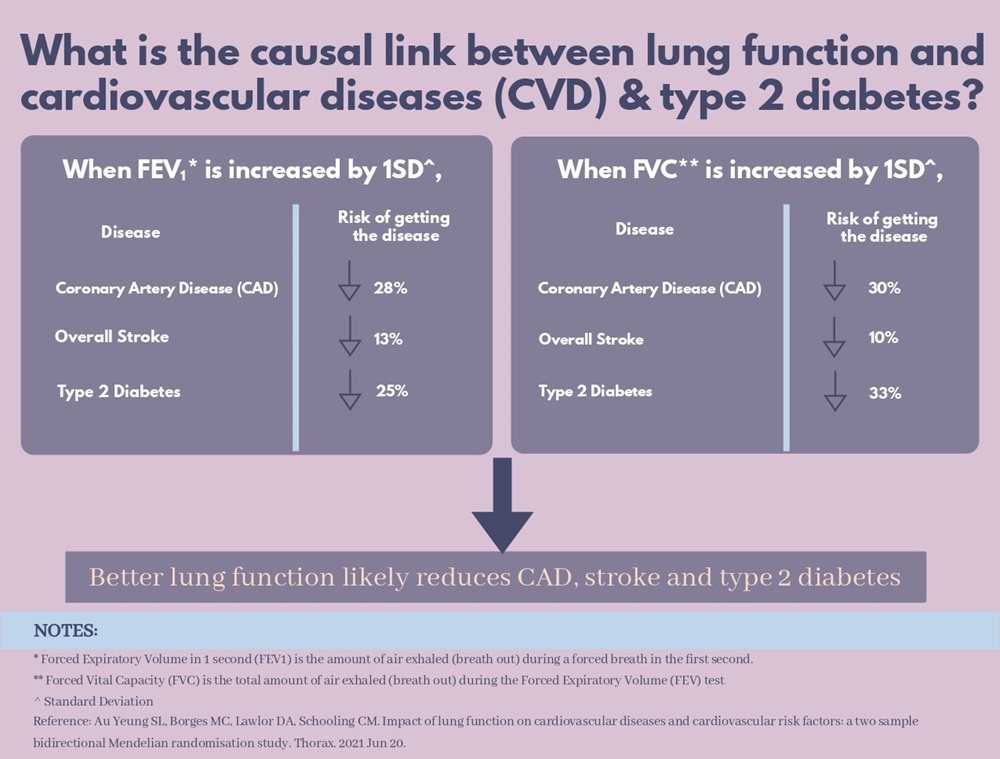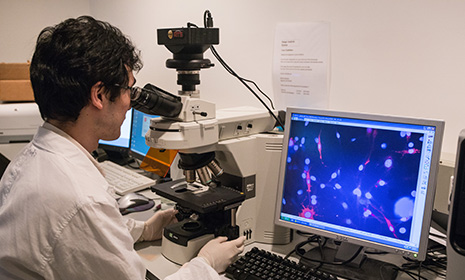HKUMed uses genetic data to establish causal link of higher lung function in reducing risk of coronary artery disease, stroke and type 2 diabetes
Researchers from the School of Public Health, LKS Faculty of Medicine of The University of Hong Kong (HKUMed), in collaboration with the University of Bristol, discovered a causal link of higher lung function in reduced risk of coronary artery disease (CAD), stroke and type 2 diabetes, using data from large-scale genome-wide association studies. The findings are now published in Thorax, a leading peer-reviewed respiratory journal. [link to the publication]
By adopting the method of Mendelian randomisation, which uses measured variants in genes of known functions to examine the causal effect of a modifiable disease, the researchers were able to establish more precise disease associations than conventional observational epidemiological studies1, which may be confounded by lifestyle factors, such as physical activity and smoking, and anthropometric characteristics (e.g. height). The researchers thus called for building biobanks in Asia to facilitate greater precision in medical research.
Research methods and findings
Using Mendelian randomisation, the researchers extracted genetic variants related to two commonly used lung function parameters: forced expiratory volume in 1 second (FEV1)2 and forced vital capacity (FVC)3 from a large European Biobank (i.e. UK Biobank, N=421,986), and assessed their relation with CVD and type 2 diabetes from large genetic summary data of genome-wide association studies (N<=1,030,836). They found that people with higher FEV1 and FVC are likely to have a reduced risk of CAD, stroke and type 2 diabetes.
‘Our study highlights the role of lung function in maintaining good cardiovascular health using a less biased design,’ said Dr Ryan Au Yeung Shiu-lun, Assistant Professor, Division of Epidemiology and Biostatistics of the School of Public Health, HKUMed, who led the research.
Research significance
This is one of the first and largest studies exploring the role of lung function in cardiovascular diseases and type 2 diabetes using Mendelian randomisation, and confirms previous observational studies that poorer lung function contributes to these diseases. This study further substantiates the importance of modifiable factors contributing to lung function, such as smoking cessation and physical activities. From a clinical perspective, whether monitoring cardiovascular and type 2 diabetes risk amongst people with poorer lung function is effective should be further explored.
This study demonstrates the importance of highly accessible big data in helping researchers understand causes of disease. Since the databases used for this study are predominantly related to European populations, a specific biobank for Asians is crucial to better understand the causes of more diseases.
‘This is particularly important because some diseases are more common in Asian populations, such as haemorrhagic stroke and nasopharyngeal cancer, and it would be better to study the causes of these diseases using Asian databases’, added Dr Au Yeung. ‘Taking “Children of 1997” birth cohort, one of the key cohorts of the School of Public Health of HKUMed supported by the Government and non-government sources, as an example, it has opened up the opportunities to implement this approach in Asian populations, meanwhile providing evidence specifically for us.’
About the research team
The research was conducted by a team led by Dr Ryan Au Yeung Shiu-lun, Assistant Professor, Division of Epidemiology and Biostatistics of the School of Public Health, HKUMed. The other member of the research team from the School was Dr Mary Schooling, Associate Professor and Cluster Leader (Non-communicable Diseases in Global Health), Division of Epidemiology and Biostatistics, HKUMed. Investigators from the University of Bristol were Dr Maria Borges and Professor Debbie Lawlor.
Acknowledgements
Dr Maria Borges was supported by Medical Research Council (MRC) Skills Development Fellowship (MR/P014054/1). Dr Borges and Professor Debbie Lawlor’s contribution to this study was supported by the British Heart Foundation (AA/18/7/34219), and Dr Borges and Professor Lawlor’s work in the MRC Integrative Epidemiology Unit at the University of Bristol received funding from the University of Bristol and UK MRC (MC_UU_00011/6).
[1] Silvestre, O. M., Nadruz, W., Jr, Querejeta Roca, G., Claggett, B., Solomon, S. D., Mirabelli, M. C., London, S. J., Loehr, L. R., & Shah, A. M. (2018). Declining Lung Function and Cardiovascular Risk: The ARIC Study. Journal of the American College of Cardiology, 72(10), 1109–1122. https://doi.org/10.1016/j.jacc.2018.06.049
[2] Forced Expiratory Volume in 1 second (FEV1) is the amount of air exhaled (breath out) during a forced breath in the first second.
[3] Forced Vital Capacity (FVC) is the total amount of air exhaled (breath out) during the Forced Expiratory Volume (FEV) test.
About the School of Public Health, HKUMed
The School of Public Health, LKS Faculty of Medicine of The University of Hong Kong has a long and distinguished history in public health education and high impact research. With world leading research in infectious diseases as well as on non-communicable diseases of both local and global importance, the School has made significant contributions through its research and advocacy to improve the health of populations and individuals, both locally and globally. The School is a leading research and teaching hub in public health on influenza and other emerging viruses, control of non-communicable and infectious diseases, tobacco control, air pollution, psycho-oncology, behavioural sciences, exercise science, life-course epidemiology, and health economics, health services planning and management. This work has informed international (e.g. the US Food and Drug Administration, Health Canada, the World Health Organization), national and local public health policies.









.png)
